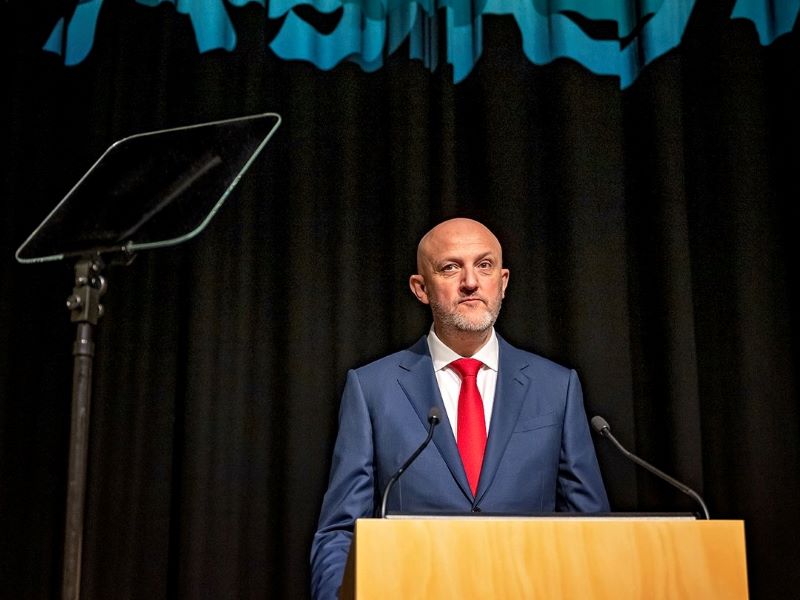The Albanese government is tightening and centralising security clearances within the domestic spy agency amid its warning foreign agents are “trying to work their way into government”.
Home Affairs minister Clare O’Neil on Wednesday introduced legislation to centralise high-level security clearance within Australian Security Intelligence Organisation (ASIO), which will also move to ongoing vetting.
The change would take control away from other security agencies and the dedicated Australian Government Security Vetting Agency.
Handing responsibility for vetting the most trusted personnel to ASIO would allow it to implement a consistent approach to issuing, maintaining and revoking Australia’s highest-level security clearances, according to Ms O’Neil.
She argued in Parliament taht the new approach is needed amid a more “complex” threat environment and as Australia embarks on advanced defence and intelligence projects like AUKUS.

She introduced the Australian Security Intelligence Organisation Amendment bill to the House of Representatives on Wednesday.
“This will reduce the risk of compromise of trusted insiders. It will maximise the utility derived from shared services to create efficiencies. It will improve the mobility and agility of our highest paid workforce enabling them to move across departments and ensure the ongoing confidence of our most trusted allies,” she said.
A new “national capability” has already been established within ASIO, as part of a 2021 move to authorised vetting agencies to begin issuing TOP SECRET-Privileged Access clearances.
Ms O’Neil’s bill will give overall control of the new standard to a national vetting authority within ASIO. All operations within other agencies that currently have control for positive vetting clearances will be transitioned to ASIO.
A quality assurance officer has been established within the Office of National Intelligence, while the Inspector-General of Intelligence and Security (IGIS) continues to have oversight of ASIO.
“Centralising Australia’s highest level security clearance vetting in ASIO leverages ASIO’s security intelligence functions, holdings and capabilities to allow a holistic assessment of a person’s suitability to hold such clearances, having regard to the most current and accurate information about the security threats confronting Australia,” Ms O’Neil said.
The management of lower level security clearances from the baseline to negative vetting level two will currently remain unchanged, with the Australian Government Security Vetting Agency to remain responsible for most of these.
The move to centralise more power within ASIO comes after its director general Mike Burgess warned in February Australia faces “an unprecedented challenge from espionage and foreign interference”.
ASIO now views espionage and foreign interference as a more pressing threat than terrorism, and Mr Burgess lashed some security clearance holders for declaring their access on professional networking sites like LinkedIn earlier this year.
“Security clearances are not titles or rewards – they come with serious on-going responsibilities,” he said in February after his agency identified nearly 16,000 instances of Australians publicly declaring they have a security clearance, and one thousand more revealing they worked in the intelligence community.
Ms O’Neil on Wednesday said foreign intelligence services are targeting security clearance holders and the privileged information they hold.
“Australia’s sovereignty absolutely demands that these secrets be protected. We have to ensure that those Australians who have access to these privileged insights are suitable to do so, and we do that through the bill that’s before the parliament today.”
In addition to handing decision making on security clearances to ASIO, the changes will also allow for more persistent and frequent evaluations of the individual suitability to manage a security clearance.
“This is really important because up until now, the security clearance process has operated at point in time; one test on the day [of] are you suitable to manage a high level clearance,” Ms O’Neil said.
“This will create a process where that assessment is made on a more ongoing basis.”
The also introduces an internal and external merits review framework, and a review mechanism, to allow individuals to appeal security clearance decisions, with some exceptions.
Ms O’Neil argued the reforms would see the Australia’s security clearance framework is “uplifted” and “hardened” in a “complex, challenging and changing security environment”.
“There are spies in our country today that are trying to work their way into government so they can steal Australia’s secrets,” Ms O’Neil said.
“And over time, the approaches of these people evolves their practices and their tools get better and more targeted. And that’s why our government must be constantly on the move to prevent them from taking our secrets.”
Do you know more? Contact James Riley via Email.


Security clearances are financial assets. They are a lot more valuable than qualifications. In the world of Contractor APS we engage people without qualifications if they have AGSVA clearances. We say we are very, very busy and our need is urgent. Once it was necessary for us to get approval from the Secretary. That’s over. Once the “threat” was Tony’s Middle East baddies. That’s over. Now Clare says it’s Mr Xi & Spies stealing our “secrets”. There’s an increased threat profile. The more we do, the worse security gets. The more money we spend the worse it gets. The more words in the PSPF, the more we upgrade the Essential 8, the worse it gets. The more we lift Baseline to NV1, the worse it gets. The enemy is at the gates. Who you gunna call? ASIO …. all good